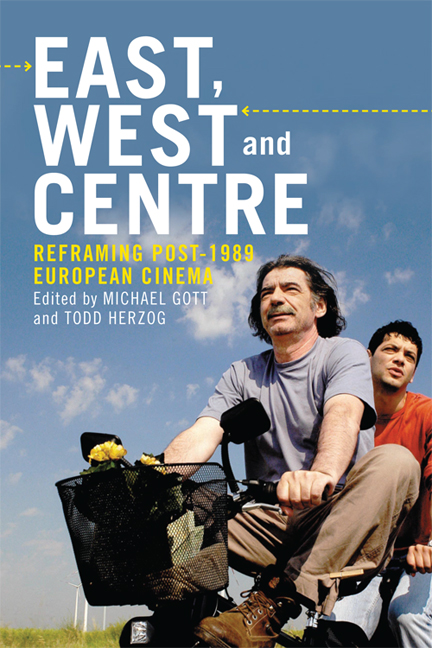Book contents
- Frontmatter
- Contents
- List of Figures
- Notes on Contributors
- Acknowledgements
- Introduction: East, West and Centre: ‘Mapping Post-1989 European Cinema’
- Part I Redrawing the Lines: De/Recentring Europe
- Part II Border Spaces, Eastern Margins and Eastern Markets: Belonging and the Road to/from Europe
- 8 Contemporary Bulgarian Cinema: From Allegorical Expressionism to Declined National Cinema
- 9 The Point of No Return: From Great Expectations to Great Desperation in New Romanian Cinema
- 10 ‘Weirdness’, Modernity and the Other Europe in Attenberg (2010, Athina Rachel Tsangari)
- 11 Lithuania Redirected: New Connections, Businesses and Lifestyles in Cinema since 2000
- 12 Lessons of Neo-liberalism: Co-productions and the Changing Image of Estonian Cinema
- 13 Decentring Europe from the Fringe: Reimagining Balkan Identities in the Films of the 1990s
- Part III Spectres of the East
- Notes
- Bibliography
- Index
11 - Lithuania Redirected: New Connections, Businesses and Lifestyles in Cinema since 2000
from Part II - Border Spaces, Eastern Margins and Eastern Markets: Belonging and the Road to/from Europe
Published online by Cambridge University Press: 05 September 2016
- Frontmatter
- Contents
- List of Figures
- Notes on Contributors
- Acknowledgements
- Introduction: East, West and Centre: ‘Mapping Post-1989 European Cinema’
- Part I Redrawing the Lines: De/Recentring Europe
- Part II Border Spaces, Eastern Margins and Eastern Markets: Belonging and the Road to/from Europe
- 8 Contemporary Bulgarian Cinema: From Allegorical Expressionism to Declined National Cinema
- 9 The Point of No Return: From Great Expectations to Great Desperation in New Romanian Cinema
- 10 ‘Weirdness’, Modernity and the Other Europe in Attenberg (2010, Athina Rachel Tsangari)
- 11 Lithuania Redirected: New Connections, Businesses and Lifestyles in Cinema since 2000
- 12 Lessons of Neo-liberalism: Co-productions and the Changing Image of Estonian Cinema
- 13 Decentring Europe from the Fringe: Reimagining Balkan Identities in the Films of the 1990s
- Part III Spectres of the East
- Notes
- Bibliography
- Index
Summary
Since the 1990s Lithuania, like other countries of the former Soviet bloc, have gone through rapid political, economic and social reforms and gradual geopolitical ‘redirections’ from the East, especially Russia, towards the West, particularly the European Union. These processes were mirrored in the national and regional cultural artefacts which were frequently promoted under umbrella terms ‘Central’, ‘East Central’, ‘New Europe’ and alike. These terms, however, as Ewa Mazierska and Paul Coates incisively note, ‘did not enter cultural discourse after the fall of communism’ but had existed long before this event (Mazierska 2010: 6) because ‘East Central’ and ‘Central’ have different connotations than ‘East’ for many nations that joined the EU in 2004. It should be noted that the umbrella term ‘Baltic Countries’, which served for indicating the cultural otherness of Lithuania, Latvia and Estonia within the Soviet Union, also had been circulating in the public discourse much before the 1990s, and can be seen as a certain tactic for situating these three republics within the cultural tradition of the Central-Northern Europe, especially countries located around the Baltic Sea. National cinemas, including Lithuanian, have been contributing significantly to the reflection of these new ‘redirections’ and existing binarisms within the European Union, dividing it into old (Western) and new (Eastern) Europes.
In her essay ‘Reliving the Past in Recent East European Cinemas’ Roumiana Deltcheva discusses the ongoing processes of cultural and geopolitical redirection and repositioning of Eastern European cinemas and the crystallisation of new cultural and political identities after the relocation of former centres and peripheries of power (Deltcheva, 197). She notes that different countries from the former Eastern bloc ‘have undergone a differentiated economic and political development’ which led to the integration of the Baltic States, the Czech Republic, Hungary, Poland, Slovakia and Slovenia into the European Union on 1 May 2004, and to the emergence of a new cultural, political and economic ‘binarism along the Central-versus-Eastern axis’ (198). It is worth noting that the ‘new binarism’ and attempt to distance the nation from the Soviet past and identity are quite noticeable in the majority of Lithuanian cinematic productions of the 2000s, where a new national identity is developed between two poles: from the similarity to ‘old Europeans’ to the difference from them and from former Soviet ‘brothers’.
- Type
- Chapter
- Information
- East, West and CentreReframing post-1989 European Cinema, pp. 175 - 190Publisher: Edinburgh University PressPrint publication year: 2014



